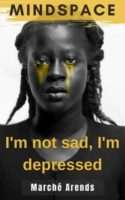I have been admitted to a psychiatric clinic twice in the last five years. Yes, you read that right – two times.
Here’s the thing, each time I was there, I was not alone. The clinic was full. Full of people who were so anxious they couldn’t function, deeply depressed and some wanting desperately to leave this earth and never return.
I am currently experiencing a depressive episode. The kind that makes it difficult to get out of bed in the morning, and to do simple tasks like brush my teeth, and comb my hair. To say that I am filled with fear when I think about how deep this dark hole could potentially be would be an understatement.
Some days, I function normally. Other days, I am consumed by so much fear to the point of inaction, as if I am frozen. Why the fear? I know this road all too well – it is a road on which lies suicidal ideation, days on end of unexplainable tears and the helpless feeling that things will never be normal again.
Depression, anxiety, suicidal ideation are not new but in many ways are still taboo. There is a stigma surrounding mental health issues and this is what kills. When people don’t feel comfortable talking about what’s really going on for them, they suffer in silence. Until it’s too late.
According to the World Health Organisation (WHO), it is estimated that 5% of adults suffer from depression globally (300 million people). Suicide is the fourth leading cause of death in people aged 15-29 years old.
In South Africa, specifically, rates of depression are as high as 10% according to the 2009 South African Stress and Health (SASH) study. However, assistance for those who are struggling is not readily available.
The South African Depression and Anxiety Group (SADAG) reports that even though 85% of patients who suffer from mental illness depend on public health services, there are only 18 beds for every 100 000 people available in hospitals.
In a nutshell, millions of people are suffering and not enough is being done to help them.
I get it though – it’s very difficult to understand this experience if you’ve never been there yourself.
Depression feels like it has always been. Like there is no beginning and no end. There is no light at the end of the tunnel – only darkness. And beyond that, even more darkness.
While I have never been suicidal in the traditional sense, I have wanted to not “be” anymore. The feeling of wanting to dig a big hole in the ground and cover myself with sand. Or, as I used to tell people struggling to understand, I wanted to take an eraser and erase myself from everyone’s lives. Because in my mind, they would be better off without me.
In these moments, I cannot possibly fathom that it will be ok. Someone trying to reassure me that it will be feels like yet another unattainable goal.
See, I’m not sad, I’m depressed. There is a difference. Sadness is fleeting, an emotion that wants to be felt and the leaves you once the job is done. Depression is a chemical imbalance in the brain that most people will struggle with for their entire lives. No amount of cheering up will take it away.
I struggled to accept my diagnoses for a long time because I felt defective. Why can’t my brain just work properly? Why am I so broken? What am I doing wrong?
I don’t feel that way anymore, though, because my diagnosis is a relief. I am reassured that this is not my fault. I now know that I am not being dramatic. I remind myself daily that I have every right to walk this journey in a way that serves me.
I’m sorry if you are not believed, if you’ve been called dramatic, if you cry in private. I’m sorry if you’ve been turned away when you’ve asked for help. I’m sorry if you have no-one to talk to. I’m sorry if you struggle to look yourself in the mirror and have been shamed into believing there is something wrong with you. You deserve more than this.
As dark as it gets sometimes, there is light, I promise. There will always be light and this too shall pass.
If you are reading this and relate to the struggle – I see you and you are not alone.
***
Read about another writer’s experience with depression here.
Tell us: Can you relate to what the author has experienced?


